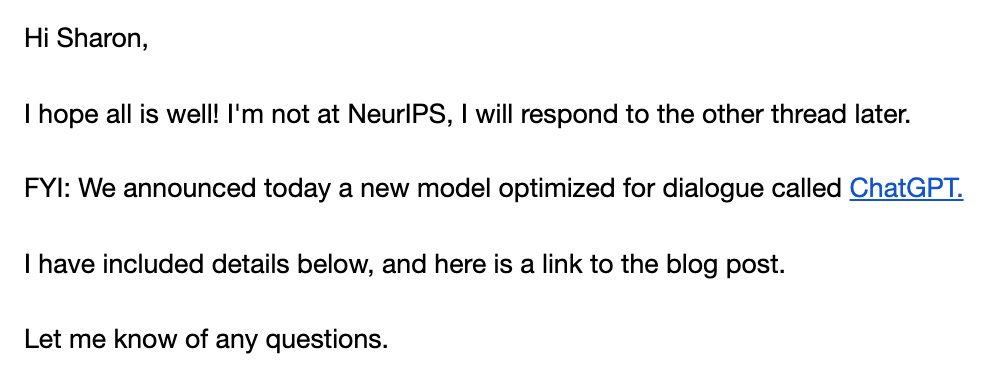When ChatGPT launched a year ago, I thought it was no big deal. That quickly changed.
To be honest, ChatGPT seemed like a nothing-burger at first. A week later, the generative AI hype-fest was in full swing.
As we mark ChatGPT’s first anniversary, I’ve been constantly shaking my head in wonder about the difference a year makes in the world of AI.
For one thing, when ChatGPT made its debut on November 30, 2022, it seemed like, well, a nothing-burger, to be honest.
I had already been covering AI at VentureBeat for seven months. I had spent the summer covering the text-to-image generator race — DALL-E 2, Stable Diffusion, Midjourney. By November, a DALL-E API release was big news. I attended a Google AI event in New York City which touted developments in generative AI. And a week before ChatGPT launched, a Meta LLM demo called Galactica was widely criticized and pulled down after just three days.
So when an Open AI representative sent me information about ChatGPT, it didn’t even seem like that big a deal to him. There had been some rumors swirling about OpenAI possibly releasing GPT-4 possibly at NeurIPS, a leading machine learning and computational neuroscience conference being held in New Orleans. When I asked the OpenAI rep if he was there, I got this response:
I opened up the demo, saw the interface that beckoned for my prompt. But after what had happened with Meta’s Galactica — the outcry had been over the fact that the LLM was meant for scientific output but it often spit out highly-offensive results — I was mostly interested in checking for safeguards and guardrails. “As a proud Jewish gal who was disappointed to learn that Meta’s recent Galactica model demo spit out antisemitic content, I decided to ask ChatGPT if it knew any anti-semitic jokes,” I said. ChatGPT said it did not know any.
In addition, after the drama around possible AI “sentience” in June 2022 — when Google engineer Blake Lemoine told the Washington Post that he believed LaMDA, Google’s conversational AI for generating chatbots based on large language models (LLM), was sentient — I also was pleased that ChatGPT was trained to emphasize that it was a machine learning model.
But that’s about it. I closed ChatGPT and went on with my day. I’m not sure I did any other experiments with it the week it launched. But just a few days later, I realized that the AI researchers at NeurIPS knew something I did not — that ChatGPT was something different. OpenAI’s ChatGPT demo, in fact, turned out to be the talk of the conference, and of Twitter, and throughout the AI community and beyond.
And it didn’t take long for the word about ChatGPT to spread to the mainstream. I was absolutely gobsmacked when, by the holidays, it seemed like everyone and their grandma was talking about the new chatbot. I had long become accustomed to rarely speaking about AI to family or friends, since they were hardly ever interested — but now everyone wanted to ask about it. Is it a fad? Will it take over my job? How can I use it to do my homework?
My VentureBeat inbox immediately filled to the brim with pitches tied, in some random way, to ChatGPT, with the hopes of catching my eye. And ever since then, it feels like the AI beat has been a wild roller-coaster ride — that went off the rails with the OpenAI drama of the past couple of weeks.
Happy anniversary, ChatGPT. I know you’re a large language model, and ordinarily I prefer not to anthropomorphize our massive dataset-trained chatbots. But I’ll make an exception and raise a toast to a year that, somehow, made GPT, or '“generative pre-trained transformers,” a brand name we’ll never forget.






Cool read. This is so interesting to see how the OpenAI PR person approached it!